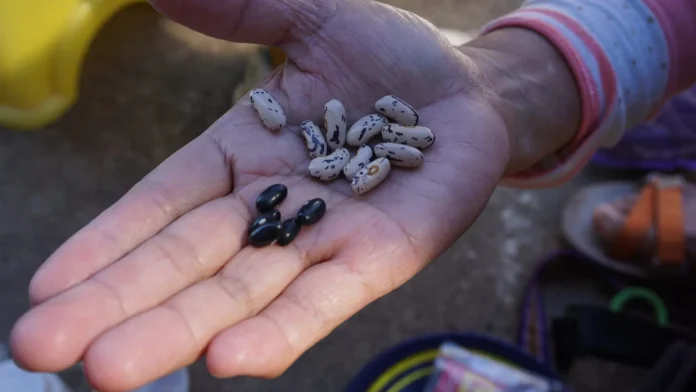Grael Bomowey was not into saving seeds until the pandemic hit. For her, this is the greatest lesson from that difficult time.
She is now looking forward to having their community seed production area after struggling to find seeds, which are expensive despite their size.
She said having a production seed area for their organic farmer group Bangaan- Fidelisan-Tanulong-Aguid-Madungo Farmers’ Association (BFTAMFA), whose members come from these villages, will help ensure seed access and provide an isolated area to protect the seed’s stable qualities.

With more rural breadwinners like Bomowey turning to save seeds to grow food and diversify crops, how can the government protect them when farmers’ seed system is not covered by national seed law?
But what is a farmers’ seed system?
Farmers’ seed systems, or what the Food and Agriculture Organization of the United Nations refers to as local seed systems, involve “farmers themselves producing, disseminating, and accessing seed: directly from their own harvest; through exchange and barter among friends, neighbors, and relatives; and through local grain markets.”
These seeds, along with those produced by the formal seed sector, are part of plant genetic resources that contribute significantly to the country’s seed agriculture needs.
However, a 2024 report by the non-governmental organization Southeast Asia Regional Initiatives for Community Empowerment (SEARICE) notes that “farmers’ seed system [being] noticeably absent” from the national seed law, or the Seed Industry Development Act of 1992, “is a serious gap” that affects its realization of inclusivity.
Bomowey felt this when she struggled to get seeds during the pandemic and switched to backyard farming because tourism, her primary source of income, had suddenly become unreliable.
“At first, I had to buy seeds. Then, in a wake, my friend gave me seeds from her mother’s collection,” she said.

Even with seeds provided by the Bureau of Plant and Industry (BPI), Bomowey believes that it is preferable if their group has its own production area because they must request from BPI every time, and what they receive depends on what is available, which may not be appropriate for their location.
These realities made her realize that, while the practice of saving seeds has declined among farmers, some of their elders continue to do so. However, because mono crop farming is less laborious, she claims farmers are abandoning traditional farming activities such as intercropping, which promotes seed saving.

Nonetheless, the informal seed sector survives primarily in the countryside, where farmers benefit from significantly lowering costs, diversifying their options, and actively participating in crop breeding, if not trial farming, in which they test, select, and mass produce locally resilient farm-saved seeds.
Its absence in the current national seed law is a concern for farmer-seed savers and farmer-breeders and their advocates, particularly given the Philippine Seed Industry Association’s pressure for the Philippines to join the International Union for the Protection of New Varieties of Plants or UPOV. That entails aligning our seed-related laws with the 1991 UPOV Convention, as the most recent iteration to protect novel, distinct, uniform, and stable new plant varieties by extending the breeders’ intellectual property rights for 20 years, while severely limiting farmers’ rights to use, save, exchange, and sell seeds.
“If the government persists in this direction, it might become necessary to establish a stand-alone farmers’ seed registration system that is distinct from the formal seed system,” SEARICE, an international NGO that advocates for peasants’ rights, including of indigenous peoples’, asserts in its 2024 report.
Along with members of the Technical Working Group for House Bill 3638, which seeks to amend the national seed law, SEARICE proposes the recognition and accreditation of these seeds, their prioritization in government subsidies, and the creation of a centralized database both for formal and informal seeds. All of these aim for harmonization of both sectors, which is key to the fair use of plant genetic resources but is absent from the UPOV 1991 because it spares breeders from disclosing the genetic material’s source or offering proof of their adherence to benefit-sharing rules.
Cathy Estavillo, secretary general of Amihan, a national federation of peasant women, said that the UPOV’s arbitrary rule can impede farmers’ access to uncertified locally-adapted saved seeds that they have grown and cared for for decades. She added that the country requires genuine agrarian reform, to which seed saving is inextricably linked.
Bomowey is also aware of these issues. “Look, during the pandemic, our government provided mostly cabbage seeds from multinational corporations. Why don’t we try other [vegetable] and fruit varieties for the highlands?”
Oxfam Philippines supported the production of this story.
This article was first published by Bulatlat.com









